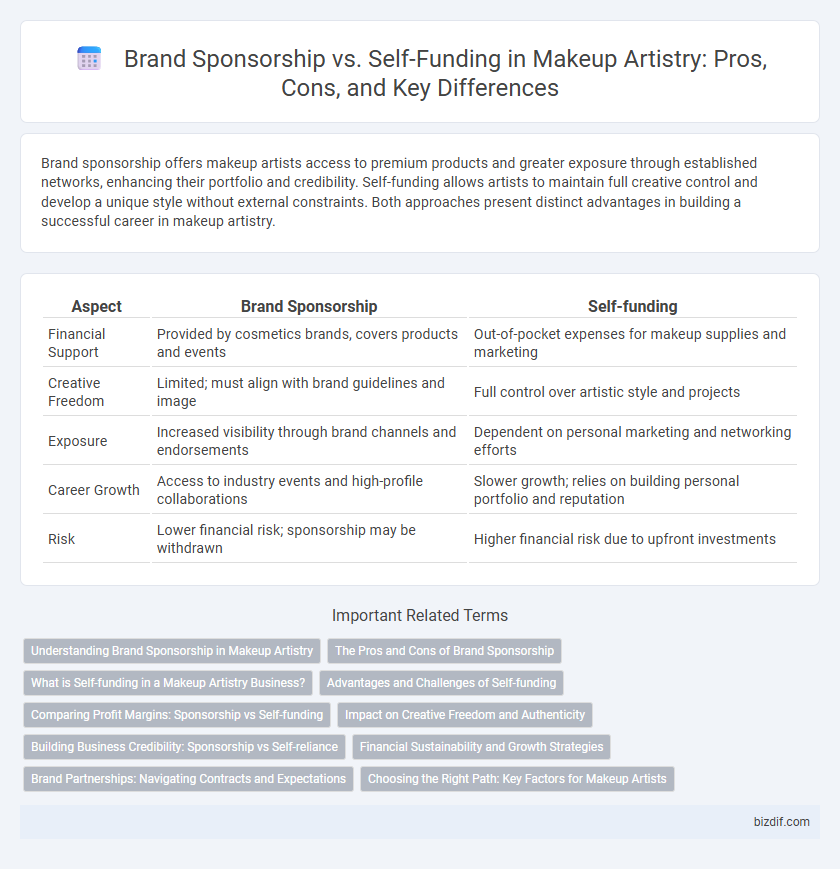Brand sponsorship offers makeup artists access to premium products and greater exposure through established networks, enhancing their portfolio and credibility. Self-funding allows artists to maintain full creative control and develop a unique style without external constraints. Both approaches present distinct advantages in building a successful career in makeup artistry.
Table of Comparison
| Aspect | Brand Sponsorship | Self-funding |
|---|---|---|
| Financial Support | Provided by cosmetics brands, covers products and events | Out-of-pocket expenses for makeup supplies and marketing |
| Creative Freedom | Limited; must align with brand guidelines and image | Full control over artistic style and projects |
| Exposure | Increased visibility through brand channels and endorsements | Dependent on personal marketing and networking efforts |
| Career Growth | Access to industry events and high-profile collaborations | Slower growth; relies on building personal portfolio and reputation |
| Risk | Lower financial risk; sponsorship may be withdrawn | Higher financial risk due to upfront investments |
Understanding Brand Sponsorship in Makeup Artistry
Brand sponsorship in makeup artistry involves collaboration between artists and cosmetic brands, providing resources like high-quality products, financial support, and marketing exposure. This partnership enhances an artist's professional credibility and expands their reach through brand-associated platforms or events. Understanding these benefits helps makeup artists evaluate the value of sponsorships compared to the independence and control offered by self-funding.
The Pros and Cons of Brand Sponsorship
Brand sponsorship offers makeup artists access to high-quality products and financial support, enabling them to expand their portfolio and reach wider audiences through brand promotion. However, reliance on sponsorship can limit creative freedom and impose obligations such as content creation and exclusivity agreements, potentially restricting artistic expression. Balancing sponsored collaborations with personal projects allows artists to maximize exposure while maintaining authenticity and control over their craft.
What is Self-funding in a Makeup Artistry Business?
Self-funding in a makeup artistry business refers to the artist using personal savings or income to finance their supplies, marketing, and professional development without relying on external brand sponsorships. This approach allows full creative control and independence but requires careful financial planning and resource management. Artists who self-fund must invest in quality products and tools while building their brand through personal networking and social media presence.
Advantages and Challenges of Self-funding
Self-funding in makeup artistry offers complete creative control and ownership of work, allowing artists to build an authentic personal brand without external constraints. This approach demands significant financial investment in quality products, tools, and marketing, posing challenges in managing cash flow and scaling the business independently. Despite these hurdles, self-funding fosters resilience and entrepreneurial skills, positioning artists for long-term sustainability and potential future sponsorship opportunities.
Comparing Profit Margins: Sponsorship vs Self-funding
Brand sponsorship in makeup artistry often offers higher profit margins by covering costs for products and marketing, allowing artists to maximize revenue without heavy upfront investments. Self-funding requires artists to purchase their own supplies and handle all expenses, reducing profit margins but granting full creative control and ownership of earnings. Analyzing expenses and income streams reveals that sponsorship reduces financial risk, while self-funding can yield greater long-term profits if managed efficiently.
Impact on Creative Freedom and Authenticity
Brand sponsorship in makeup artistry often provides financial support and exposure but can limit creative freedom due to brand guidelines and promotional requirements. Self-funding enables artists to maintain full authenticity and experiment freely without external constraints, fostering unique and personalized artistry. Balancing sponsorship benefits with self-driven projects can enhance both creative expression and career growth in the competitive makeup industry.
Building Business Credibility: Sponsorship vs Self-reliance
Brand sponsorship offers makeup artists immediate credibility through association with established product lines and industry recognition, boosting client trust and expanding professional networks. Self-funding demands consistent quality, unique branding, and strategic marketing to build credibility independently, showcasing resilience and entrepreneurial skill. Both paths influence long-term reputation, but sponsorship accelerates visibility while self-reliance fosters authentic brand identity.
Financial Sustainability and Growth Strategies
Brand sponsorship offers makeup artists financial stability through consistent funding and access to high-quality products, accelerating business growth and market reach. Self-funding demands careful budget management and reinvestment but provides full creative control, fostering sustainable, organic growth tailored to personal brand identity. Balancing brand sponsorship with strategic self-investment optimizes long-term financial sustainability and scalability in the competitive makeup artistry industry.
Brand Partnerships: Navigating Contracts and Expectations
Brand partnerships in makeup artistry require careful negotiation of contracts to ensure clear terms on deliverables, usage rights, and exclusivity clauses that protect both the artist and the sponsoring brand. Understanding expectations around content creation, deadlines, and compensation structures is crucial to maintaining professional relationships and maximizing benefits. Leveraging legal counsel or industry experts can help artists navigate complex agreements and secure favorable sponsorship deals.
Choosing the Right Path: Key Factors for Makeup Artists
Makeup artists must evaluate their career goals, financial stability, and creative control when choosing between brand sponsorship and self-funding. Brand sponsorship offers access to exclusive products and industry exposure but may require adherence to brand guidelines, impacting artistic freedom. Self-funding allows full creative autonomy and the ability to build a personal brand but demands strong marketing skills and initial investment in tools and education.
Brand Sponsorship vs Self-funding Infographic

 bizdif.com
bizdif.com